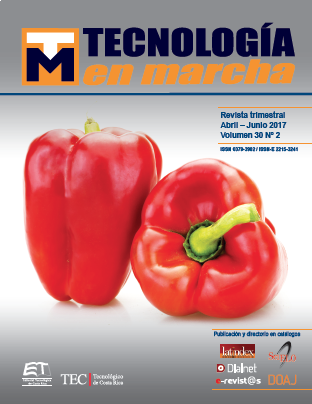Inquiry of analytical methodologies for measuring two gold cyanide solutions in electronic devices industry in Costa Rica
Main Article Content
Abstract
The gold dissolved in cyanide can be used in the chemical plating process to produce a coating on another metal, a process that is widely used in the manufacture of electrical connectors, and which thus can deposit a specific amount of a metal where required for the connector to have a good electrical conduction.
Due to the importance of the bath containing gold in the electrodeposition process, it is necessary to have an analytical method that is capable of quantifying the gold in a reliable way, which is why two analytical techniques were studied: atomic absorption spectrophotometry Spectroscopy and X-Ray Fluorescence, to establish what is the most appropriate analytical method for the analysis of gold in cyanide solutions, and then validated to ensure reliability of results. After this study it was found that the analysis of gold by atomic absorption technique provides more accurate results and accuracy, to be established with high reliability by requiring it under laboratory conditions set forth herein.
Article Details
Los autores conservan los derechos de autor y ceden a la revista el derecho de la primera publicación y pueda editarlo, reproducirlo, distribuirlo, exhibirlo y comunicarlo en el país y en el extranjero mediante medios impresos y electrónicos. Asimismo, asumen el compromiso sobre cualquier litigio o reclamación relacionada con derechos de propiedad intelectual, exonerando de responsabilidad a la Editorial Tecnológica de Costa Rica. Además, se establece que los autores pueden realizar otros acuerdos contractuales independientes y adicionales para la distribución no exclusiva de la versión del artículo publicado en esta revista (p. ej., incluirlo en un repositorio institucional o publicarlo en un libro) siempre que indiquen claramente que el trabajo se publicó por primera vez en esta revista.

